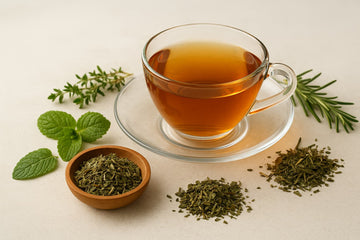Have you ever felt that gentle calm after a warm sip of herbal chai? That soothing feeling is your body responding to a centuries-old natural remedy that still holds power today. If you still wonder– Herbal teas are not just flavourful brews. They carry an incredible range of benefits that can influence how you feel, think, and even rest.
If you’ve been searching for a natural way to enhance focus, balance your digestion, or relax after a long day, the world of herbal drinks is where your wellness journey can unfold.
Let’s explore how a humble cup of herbal tea can enrich your daily routine.
The Growing Love for Herbal Drinks
Across cultures, herbal teas have long been a trusted source of daily nourishment. From the Himalayas to urban kitchens, people brew leaves, flowers, roots, and spices for both flavour and wellbeing. As you shift toward cleaner living, herbal teas align with that mindset with no caffeine buzz, no artificial additives, just nature in its simplest, most comforting form.
Many health-conscious individuals now favour herbal drinks over coffee for sustained energy and inner balance. With each blend carrying distinct properties, there’s always something to match your mood or your goal.
Why Herbal Tea Benefits Deserve Your Attention
Each cup of herbal tea works like a quiet health ally. Let’s dive into the core herbal tea benefits that stand out the most.
1. Natural Stress Relief
Certain herbal tea ingredients like chamomile, tulsi, and lavender promote relaxation. They calm your nervous system and ease tension from your muscles. The warm aroma alone can trigger a gentle wave of calm, setting the tone for restful evenings.
2. Improved Digestion
If your stomach feels heavy after a meal, a cup of peppermint or ginger tea can restore balance. These types of herbal tea support enzyme activity and improve nutrient absorption.
3. Immune System Support
Herbal teas rich in antioxidants fortify your immunity, e.g., hibiscus or buransh (rhododendron). Buransh juice benefits go deeper than just hydration; it contains anti-inflammatory properties that support your heart and respiratory health. When brewed as Buransh sharbat, it can refresh your body while nourishing it with vital phytonutrients.
4. Detoxification and Skin Health
Dandelion and lemongrass teas act as gentle detox agents. They assist your liver and kidneys in flushing out impurities, keeping your skin clearer and more radiant. Over time, you’ll notice fewer dull days.
5. Better Sleep Quality
If you struggle with sleep, a warm herbal chai made from chamomile or valerian root before bed can bring remarkable relief. It signals your body to slow down, allowing deeper rest without dependency on artificial sleep aids.
Types of Herbal Tea
There isn’t one best herbal tea for everyone. Your body’s needs evolve daily, and so do the teas that support them. Here’s a herbal tea list that gives you a glimpse into what nature offers.
|
Type |
Primary Ingredient |
Main Benefit |
|
Chamomile Tea |
Chamomile flower |
Calms nerves and aids sleep |
|
Tulsi Tea |
Holy basil leaves |
Boosts immunity and relieves stress |
|
Peppermint Tea |
Peppermint leaves |
Eases digestion |
|
Hibiscus Tea |
Hibiscus petals |
Improves heart health |
|
Buransh Tea |
Rhododendron flower |
Supports heart and respiratory wellness |
|
Ginger Tea |
Fresh or dry ginger |
Warms body and strengthens metabolism |
|
Lemongrass Tea |
Lemongrass stalks |
Detoxifies and freshens breath |
That list of herbal teas and their medicinal uses is only a beginning. Your choice can depend on mood, season, or even the time of day.
Herbal Tea Ingredients That Transform Your Cup
Behind every herbal tea lies a story of synergy. The ingredients interact to provide layers of benefits.
Tulsi (Holy Basil): Enhances immunity and reduces anxiety.
Ginger Root: Known for warming energy and gut support.
Liquorice Root: Smooths sore throats and boosts adrenal function.
Cinnamon: Balances blood sugar and adds aroma.
Cardamom: Supports digestion and respiratory health.
Shatavari: Enhances female hormonal balance and vitality. You can also learn how to take Shatavari powder by mixing it with warm milk or blending it into your morning drink for daily rejuvenation.
Discovering the Buransh Magic
Buransh, known scientifically as Rhododendron arboreum, grows abundantly in the Himalayan regions. Traditionally used in both Buransh sharbat and herbal teas, it’s prized for its cooling and antioxidant qualities.
When taken regularly, buransh tea can regulate blood pressure naturally, improve heart endurance, and provide relief from altitude-induced fatigue.
If you enjoy regional flavours, trying a Buransh juice blend can be a refreshing and healthful twist to your routine. It’s one of the lesser-known herbal drinks that bridges tradition and wellness beautifully.
How Herbal Tea Complements Nutrient-Rich Foods
Your cup of herbal tea pairs well with clean, whole foods. Try adding different types of dry fruits to your daily plan. They provide minerals, natural fibre, and slow-release energy. Pairing dry fruits with herbal tea creates a balanced ritual that nourishes both body and mind.
For example:
- Sip tulsi tea with a handful of soaked almonds in the morning.
- Enjoy ginger tea with dates in the afternoon for warmth.
- Pair chamomile tea with walnuts before bedtime for better rest.
How to Choose the Best Herbal Tea for You
The key lies in observing your body. Think about what it craves.
- Feeling tired? Try peppermint or lemongrass for an instant lift.
- Need grounding? Tulsi or cinnamon brings calm.
- Want detox support? Choose dandelion or hibiscus.
- Facing hormonal shifts? Incorporate Shatavari powder in moderation.
The best herbal tea for you is one that fits your rhythm. Trust your senses. Smell, taste, and notice how your body reacts. Over time, you’ll discover a personal blend that becomes part of your wellness identity.
A Consistent Herbal Routine
To enjoy the full herbal tea benefits, consistency is essential. Brew fresh each time using clean water and high-quality dried herbs. Avoid over-steeping, as bitterness may appear. A short, mindful preparation adds to the experience.
- Morning: Start with tulsi or lemongrass tea to awaken energy.
- Afternoon: Refresh with peppermint or buransh tea.
- Evening: Unwind with chamomile or ginger tea.
Final Thoughts
Your wellness does not always need complicated formulas. Sometimes, it begins with a simple cup of herbal tea. When you understand its power, you start viewing every sip as an act of nourishment and self-awareness.
Herbal teas blend ancient wisdom with daily simplicity. The next time you prepare your brew, remember— consuming herbal teas is a mindful practice that connects you to nature.
So, what’s in your cup today?
Suggested = Benefits of Warm Water and Honey Every Morning










